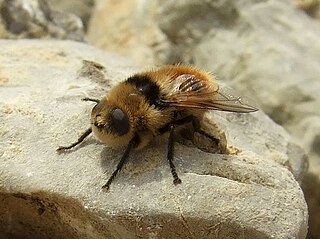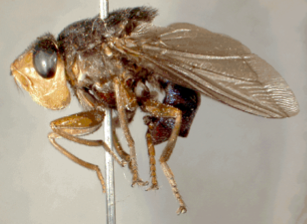Mycoplasma hominis is a species of bacteria in the genus Mycoplasma. M. hominis has the ability to penetrate the interior of human cells. Along with ureaplasmas, mycoplasmas are the smallest free-living organisms known.

Botflies, also known as warble flies, heel flies, and gadflies, are a family of flies known as the Oestridae. Their larvae are internal parasites of mammals, some species growing in the host's flesh and others within the gut. Dermatobia hominis is the only species of botfly known to parasitize humans routinely, though other species of flies cause myiasis in humans.
Staphylococcus hominis is a coagulase-negative member of the bacterial genus Staphylococcus, consisting of Gram-positive, spherical cells in clusters. It occurs very commonly as a harmless commensal on human and animal skin and is known for producing thioalcohol compounds that contribute to body odour. Like many other coagulase-negative staphylococci, S. hominis may occasionally cause infection in patients whose immune systems are compromised, for example by chemotherapy or predisposing illness.
One World is the largest human rights film festival in the world, held annually in Prague and other 36 cities of the Czech Republic, with a selection later shown in Brussels and other countries. The festival highlights quality documentary films on social, political, environmental, media and human rights issues. One World presents over a 100 documentary films from all around the globe and organizes numerous Q&As with filmmakers and experts.

Sarcocystis is a genus of protozoan parasites, with many species infecting mammals, reptiles and birds. Its name is dervived from Greek sarx = flesh and kystis = bladder.

The human botfly, Dermatobia hominis, is a species of botfly whose larvae parasitise humans. It is also known as the torsalo or American warble fly, though the warble fly is in the genus Hypoderma and not Dermatobia, and is a parasite on cattle and deer instead of humans.

Blastocystis is a genus of single-celled heterokont parasites belonging to a group of organisms that are known as the Stramenopiles that includes algae, diatoms, and water molds. Blastocystis consists of several species, living in the gastrointestinal tracts of species as diverse as humans, farm animals, birds, rodents, reptiles, amphibians, fish, and cockroaches. Blastocystis exhibits low host specificity, and many different species of Blastocystis can infect humans, and by current convention, any of these species would be identified as Blastocystis hominis.

Blastocystosis refers to a medical condition caused by infection with Blastocystis. Blastocystis is a protozoal, single-celled parasite that inhabits the gastrointestinal tracts of humans and other animals. Many different types of Blastocystis exist, and they can infect humans, farm animals, birds, rodents, amphibians, reptiles, fish, and even cockroaches. Blastocystosis has been found to be a possible risk factor for development of irritable bowel syndrome.

Homo homini lupus, or in its unabridged form Homo homini lupus est, is a Latin proverb meaning "A man is a wolf to another man," or more tersely "Man is wolf to man." It has meaning in reference to situations where people are known to have behaved in a way comparably in nature to a wolf. The wolf as a creature is thought, in this example, to have qualities of being predatory, cruel, inhuman i.e. more like an animal than civilized.

The End of Man is a 1971 Brazilian film directed by José Mojica Marins. The unusual and surreal film was made on a low budget, and rather than the often disturbing gothic horror of his previous films, The End of Man conveys a sense of social black humor and tongue in cheek style seen in other Brazilian Mouth of Garbage Cinema (Boca do Lixo) of the late 1960s and early 1970s.
Cryptosporidium hominis, along with Cryptosporidium parvum, is among the medically important Cryptosporidium species. It is an obligate parasite of humans that can colonize the gastrointestinal tract resulting in the gastroenteritis and diarrhea characteristic of cryptosporidiosis. Unlike C. parvum, which has a rather broad host range, C. hominis is almost exclusively a parasite of humans. As a result, C. hominis has a low zoonotic potential compared to C. parvum. It is spread through the fecal-oral route usually by drinking water contaminated with oocyst laden feces. There are many exposure risks that people can encounter in affected areas of the world. Cryptosporidium infections are large contributors of child death and illness in heavily affected areas, yet low importance has been placed on both identifying the species and finding more treatment options outside of nitazoxanide for children and AIDS patients.

When the Gods Fall Asleep is a 1972 Brazilian film directed by José Mojica Marins. Marins is best known for the Zé do Caixão film series. The film is a sequel to Marins' 1971 film The End of Man, in which the character of Finis Hominis, an influential, messianic culture figure turns out to be an escaped mental patient. Rather than the horror themes which Marins was noted for, the film, like its predecessor, is low budget black humored social satire.

Cardiobacterium hominis is a Gram-negative bacillus (rod-shaped) bacterium commonly grouped with other bacteria into the HACEK group. It is one of several bacteria that is normally present in the mouth and upper part of the respiratory tract such as nose and throat. However, it may also rarely cause endocarditis, an infection of the heart valves.
The Homo Homini Award is given annually by the Czech human rights organization People in Need to "an individual in recognition of a dedication to the promotion of human rights, democracy and non-violent solutions to political conflicts". The award is presented at the One World Film Festival, the world's largest human rights film festival.
The exact role of Mycoplasma hominis in regards to a number of conditions related to pregnant women and their (unborn) offspring is controversial. This is mainly because many healthy adults have genitourinary colonization with Mycoplasma, published studies on pathogenicity have important design limitations and the organisms are very difficult to detect. The likelihood of colonization with M. hominis appears directly linked to the number of lifetime sexual partners Neonatal colonization does occur, but only through normal vaginal delivery. Caesarean section appears protective against colonization and is much less common. Neonatal colonization is transient.
Presumption in the canon law of the Catholic Church is a term signifying a reasonable conjecture concerning something doubtful, drawn from arguments and appearances, which by the force of circumstances can be accepted as a proof. It is on this presumption our common adage is based: "Possession is nine points of the law". Presumption has its place in canon law only when positive proofs are wanting, and yet the formulation of some judgment is necessary. It is never in itself an absolute proof, as it only presumes that something is true. Canonists divide presumption into:
- presumption of law (juris), or that which is deduced from some legal precept or authority expressed in law or based upon precedents or similarities, and
- presumption of a judge or man, when the law is silent on the subject and an opinion must be formed according to the way that circumstances and indications would affect a prudent man or judge.
Peptacetobacter hiranonis is a Gram-positive, cellulolytic and motile bacterium from the family Peptostreptococcaceae which has been isolated from human faeces in Okinawa in Japan.
Pham Doan Trang is a Vietnamese author, blogger, journalist, publisher, and democracy activist. She received the 2017 Homo Homini Award from People In Need, who called her "one of the leading figures of the contemporary Vietnamese dissent".
Adam Gottlieb Weigen (1677–1727) was a German pietist, theologian and early animal rights writer.
Peptacetobacter is a genus of bacteria in the family Peptostreptococcaceae.







